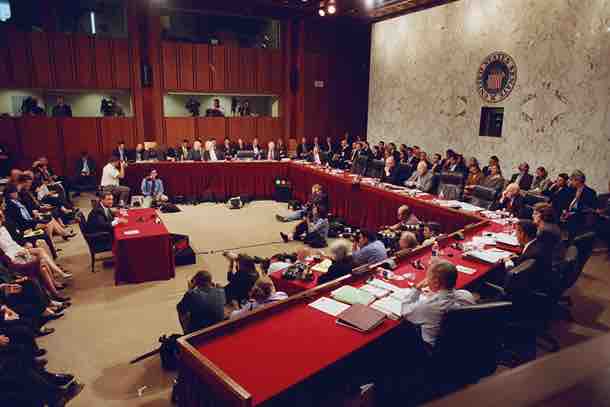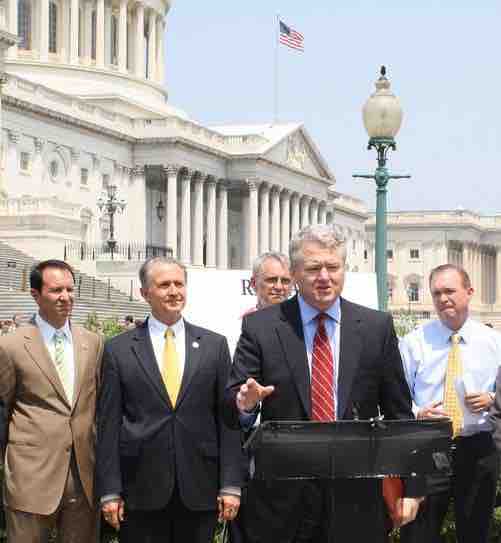Background
In the United States, advice and consent is a power of the United States Senate to be consulted on and approve treaties signed and appointments made by the President of the United States to public positions, including Cabinet secretaries, federal judges, and ambassadors . This power is also held by several state Senates, which are consulted on and approve various appointments made by the state's chief executive, such as some statewide officials, state departmental heads in the Governor's cabinet, and state judges (in some states).

John Roberts Confirmation Hearings
Under the Constitution, the Senate have advice and consent on any nominations made by the President to the Supreme Court of the United States. Here, the Senate Judiciary Committee confirmation hearings of John Roberts to be Chief Justice of the Supreme Court of the United States, 2005.
Constitutional Provision
Article II, Section 2, paragraph two of the United States Constitution states: "The President shall have Power, by and with the Advice and Consent of the Senate, to make Treaties, provided two thirds of the Senators present concur; and he shall nominate, and by and with the Advice and Consent of the Senate, shall appoint Ambassadors, other public Ministers and Consuls, Judges of the supreme Court, and all other Officers of the United States, whose Appointments are not herein otherwise provided for, and which shall be established by Law: but the Congress may by Law vest the Appointment of such inferior Officers, as they think proper, in the President alone, in the Courts of Law, or in the Heads of Departments. "
The term "advice and consent" first appears in the United States Constitution in Article II, Section 2, Clause 2, referring to the Senate's role in the signing and ratification of treaties. This term is then used again, to describe the Senate's role in the appointment of public officials, immediately after describing the president's duty to nominate officials .

Advice and Consent
Senators also have the power of "advice and consent" over other authorities in the federal or state governments.
The founding fathers of the United States included the language as part of a delicate compromise concerning the balance of power in the federal government. Many delegates preferred to develop a strong executive control vested in the president, while others, worried about authoritarian control, preferred to strengthen the Congress. Requiring the president to gain the advice and consent of the Senate achieved both goals without hindering the business of government.
Under the Twenty-fifth Amendment, appointments to the Office of Vice President are confirmed by a majority vote in both Houses of Congress, instead of just the Senate.
Historical Development of Power
Several framers of the U.S. Constitution believed that the required role of the Senate is to advise the president after the nomination. Roger Sherman believed that advice before nomination could still be helpful. Likewise, President George Washington took the position that pre-nomination advice was allowable but not mandatory. The notion that pre-nomination advice is optional has developed into the unification of the advice portion of the power with the "consent" portion, although several presidents have consulted informally with senators over nominations and treaties.
Use today
The actual motion adopted by the Senate when exercising the power is "to advise and consent," which shows how initial advice on nominations and treaties is not a formal power exercised by the Senate. For appointments, a majority of senators are needed to pass a motion "to advise and consent," but unless the appointment has the support of three-fifths of senators, a filibuster blocking the passage of the motion is possible. Typically, a congressional hearing is held to question the appointee. For a treaty, a two-thirds vote of the Senate is required anyway; thus, a filibuster could only delay passage.